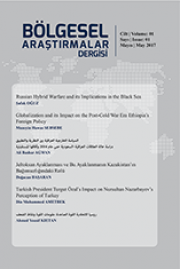Russian Hybrid Warfare and Its Implications in The Black Sea
Russian Hybrid Warfare and Its Implications in The Black Sea
Author(s): Şafak OğuzSubject(s): Security and defense, Military policy, Geopolitics
Published by: Mehmet Seyfettin Erol
Keywords: Russia; Hybrid Warfare; NATO; Black Sea; Crimea;
Summary/Abstract: This paper will study Russian hybrid warfare in Ukraine and especially in Crimea, and analyse its implications on the Black Sea region. Although hybrid warfare is an old concept, theoretical studies of it began in Western countries mainly in the post-Cold War era, focusing on asymmetrical threats against the conventional superiority of Western countries such as the USA. The September 11th attacks and the 2006 Lebanon War played important roles in the evolution of hybrid warfare theories. Studies in Russia on hybrid warfare, which the Russians call “non-linear war,” are based primarily on lessons learned during the Color Revolutions and the Arab Spring. Hybrid warfare emerged as one of the main security issues for the West, and especially for NATO, with the beginning of the Russia-Ukraine crisis. The Russian military strategies that Western countries called “hybrid warfare” resulted in the successful annexation of Crimea and became a serious security issue for the West. Russian military activities during the Ukrainian crisis and the Russian annexation of Crimea also resulted in important changes in the security of the Black Sea. The crisis intensified the Russian military build-up and the military presence of NATO, especially the USA, in the region, while the Black Sea, which was intended to be a peaceful region, became a stage for a military showdown between NATO and Russia.
Journal: Bölgesel Araştırmalar Dergisi
- Issue Year: 1/2017
- Issue No: 1
- Page Range: 1-20
- Page Count: 20
- Language: English

